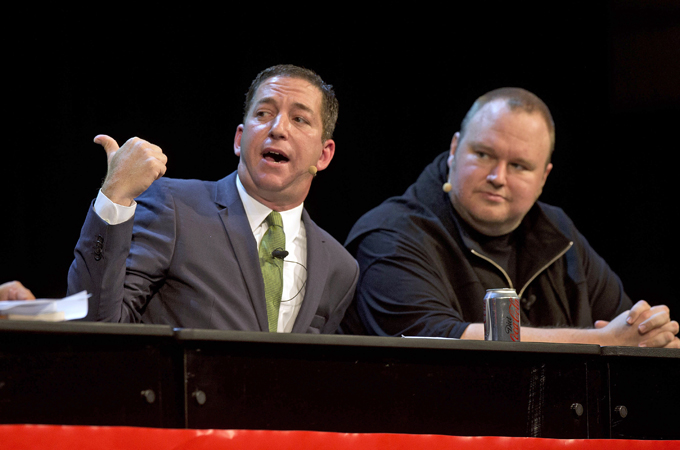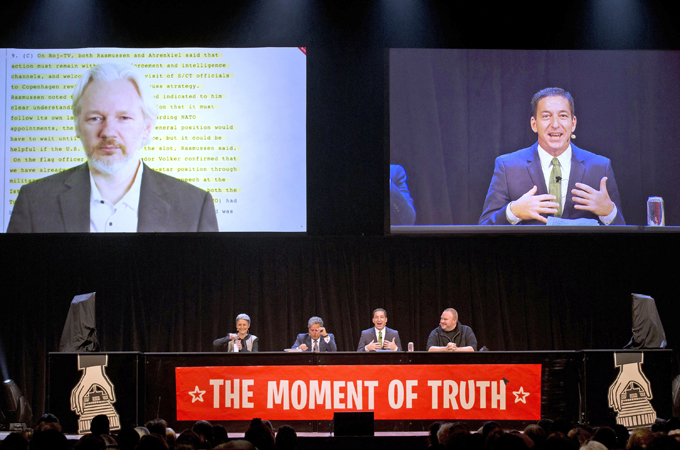New Zealand’s ‘Fifth Hand’
NSA whistleblower Snowden and journalist Greenwald accuse Wellington of mass spying on New Zealanders.

Auckland, New Zealand – It was an assembly of three of the US’ most wanted cyber-fugitives, brought together via video-link in the Town Hall of New Zealand’s largest city, Auckland.
Sitting on the panel was the ringmaster and the money-man behind the whole show, dubbed “The Moment of Truth”, an event that Kim Dotcom said would change the course of the general election on Saturday.
Keep reading
list of 4 itemsNPR editor resigns after accusing US outlet of liberal bias
Lawmakers brawl as Georgian Parliament considers ‘foreign agent’ bill
Journalist loses foot after being badly wounded in Israeli attack in Gaza
The German-born internet entrepreneur had a beaming smile spread across his face throughout the long speeches on Monday, and could be heard chuckling constantly as guest speakers fired shot after shot at the New Zealand government.
Alongside him was American journalist Glenn Greenwald, who New Zealand Prime Minister John Key had earlier called “a loser”.
|
|
| Kim Dotcom launches political party |
Two big names couldn’t be there in person because, like Dotcom, they’re on the run from the law. WikiLeaks founder Julian Assange appeared from the embassy of Ecuador in London, where he’s been holed up for more than two years trying to avoid being extradited to Sweden. He’s facing allegations of sex crimes there, while he’s also being investigated in the United States for his role in the release of classified US government documents.
It was also impossible for former National Security Agency analyst Edward Snowden to fly to New Zealand, an ally of the United States, while he’s wanted in the US on charges of stealing government property and espionage, after he took thousands of classified documents while working for the NSA and subsequently leaking many to the media.
He appeared from his base, somewhere in Russia, and alleged that New Zealanders are being watched covertly. Snowden said while he was working at the NSA, he was able to see private communications from New Zealanders via the previously top secret computer system XKeyscore, which he alleges New Zealand’s Government Communications Security Bureau (GCSB) helped to develop.
“I can see everything. I can see what book you look at Amazon.com. I can see who you talked to. I can see who your friends on Facebook are. I can see the text messages you’ve sent. I can read the emails you wrote,” said Snowden.
Key doesn’t deny the use of XKeyscore.
New Zealand is part of the so-called “Five Eyes”, an intelligence gathering union that also includes Australia, the United States, Canada, and the United Kingdom. Snowden alleged part of that arrangement is that the Americans have boots on the ground here.
“There are actually NSA facilities in New Zealand that the GSCB is aware of, and that means the prime minister is aware of,” Snowden said.
Plausible deniability
Key dismissed the allegations, saying there is no mass programme of spying on New Zealanders. But he admitted his agencies did look into a surveillance programme following two major cyber attacks on New Zealand companies in recent years. But the system was never activated because it was deemed to be a step too far in its invasiveness. He even declassified documents to prove his case.
 |
| Journalist Glenn Greenwald, left, and Kim Dotcom attend a political forum at Town Hall in Auckland [AP] |
“There is not, and never has been, mass surveillance of New Zealanders undertaken by the GCSB,” said Key.
Despite all the hacking power on show, Snowden and Greenwald produced plenty of rhetoric, but little evidence apart from three vague documents. However, they claim the operation to spy on New Zealanders, called Speargun, involved tapping into an undersea communications cable owned and operated by Southern Cross Cable.
Its chief executive said there was no way the cable could be tampered with, without Southern Cross Cable knowing.
A computer security analyst who spoke to Al Jazeera said that’s simply not true.
“They have no idea what these people can do,” Hank Wolfe, an associate professor at New Zealand’s Otago University, said. He added the NSA has the best technology in the world, and could quite conceivably tap the cable without its operators noticing anything untoward.
“These people have been doing this for years, they have perfected the technology to do things that you and I can’t even imagine.”
Dotcom didn’t say much during the evening, limiting himself to a few “thank yous” to his fellow fugitives.
“You are heroes,” he said to Snowden and Assange.
Then there was an obligatory spiel about the fact the event was being brought to you via his new venture, cloud-based file-hosting website Mega, which apparently offers encrypted, high-speed video conferencing.
Most New Zealanders want their privacy respected and would welcome any claims of spying by their government, or anyone else’s, being brought into the open.
There are plenty of questions the next government must answer about exactly what’s going on in the intelligence services of New Zealand, and the United States. But the problem lies with the man behind the “Moment of Truth”, Dotcom, a self-confessed hacker who’s wanted in the US to face copyright infringement and piracy charges relating to his now-defunct file-sharing website, Megaupload.
Internet-Mana
A German New Zealand resident who lives in a sprawling, rented mansion on the outskirts of Auckland, Dotcom said he’s despised the prime minister since he was arrested in a spectacular raid by police on his home in 2012.
To try to achieve his goal of staying in New Zealand, he formed his own political party, called Internet-Mana.
Kim Dotcom has basically denied it, but there's a lot of people who certainly suspect his fingers over this, even if the fingerprints aren't there.
He can’t stand in the election because he’s not a citizen, but he’s the self-anointed party visionary and is said to have backed it to the tune of almost $2.5m.
It’s gaining some support among a section of youth who seem disillusioned with the ways of conventional political parties. Internet-Mana is likely to win some seats in parliament, but not enough to influence the overall result, given the two major parties have said categorically they will not work with Dotcom in any coalition government.
Despite that, he’s been a constant throughout the campaign with his name linked to a series of scandals following the release of a book by journalist Nicky Hager called Dirty Politics.
It was based on emails and messages hacked from the computer of right-wing blogger Cameron Slater, which show a strong link between him and some key staff in the government.
The book alleges there was a coordinated campaign by Slater and the staff to attack opponents of the ruling National Party.
The identity of the hacker hasn’t been revealed, but suspicion has fallen on Dotcom, who during the election campaign has boasted about his past hacking triumphs.
“Kim Dotcom has basically denied it, but there’s a lot of people who certainly suspect his fingers over this, even if the fingerprints aren’t there,” said New Zealand Herald political columnist Fran O’Sullivan.
That story has died down for now, but the story of Dotcom hasn’t.
Prior to the “Moment of Truth” event, he produced an email that he said proved there was a deal in place for his New Zealand residency to be fast-tracked, thereby making it easier for the US to get their hands on him.
 |
| WikiLeaks founder Julian Assange, top left, appeared via video link from London [AP] |
The email is allegedly from Warner Brothers Chairman Kevin Tsujihara to an executive at the Motion Picture Association of America, a powerful lobby group that represents several major Hollywood studios.
Among other things it says, “John Key told me in private that they are granting Dotcom residency despite pushback from officials about his criminal past. His AG will do everything in his power to assist us with our case.”
Dotcom said the email was written in October 2010 and proves the Prime Minister Key was lying when he said he hadn’t heard of him before his arrest in 2012.
But when Dotcom was questioned about the email and the allegations on Monday, he refused to talk and became angry with reporters who kept pushing him on the issue.
With days before the election, Kim Dotcom’s “Moment of Truth” produced little in the way of hard evidence, but it was another moment in the spotlight for a man who’s managed to dominate the campaign like no one has ever done before.